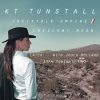Liverpool Sound and Vision Rating * * * *
Invisible Empire/Crescent Moon marks a new line in the sand for K T Tunstall, perhaps the start of new beginning for the Scottish singer/musician as she comes to terms with life and what it offers.
The raw emotion that filters through every track on the album is one that will endear her to her legion of fans as every sinew, muscle and vessel is to put the test, given a reason to howl at the desert moon. Ms. Tunstall takes advantage of this feeling and produces a thoughtful and somewhat considered performance in the studio, whilst all the time seeking answers to some very age old and relevant questions that every human being asks at one point or another during their life time.
The sense of loneliness prevails, of isolation rather than solitude and each perfectly placed guitar note beats in time with her own broken but reflective heart. The voice that for so long has been as much about Ms. Tunstall as her lyric writing is once again on show and as the listener takes in each song offered to them, that voice, the sweetness and charm seems to be hiding something more deep and hurtful. The combination of this with a more laid bare effect with the acoustic guitar gives it a deliciously refreshing approach, deliberately understated and enjoyable that the experience will be pleasing but always at the back of the head, the thoughts will be there urging you to fathom the enormity of what the musician has put herself through emotionally in order to get this album out.
The standout compositions are the amazing Made of Glass which is poetic and personally philosophical, the weighty How You Kill Me, the beautiful Old Man Song and the sensational No Better Shoulder. However this is not an album which has a few weak songs cowering in the corner afraid to get played, from the start it is a truly gorgeous piece of work but one cannot help but feel for Ms. Tunstall as the music envelops her intended target and long term fans.
Ian D. Hall
